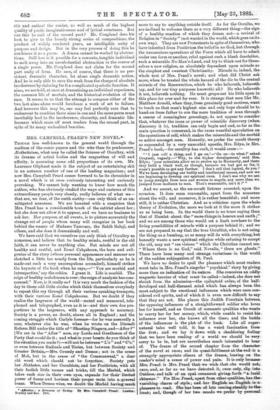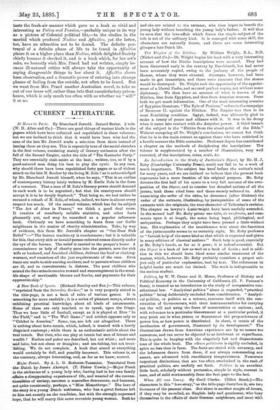MRS. CAMPBELL PRA.ED'S NEW NOVEL.*
Marren less well-known to the general world through the medium of the comic papers and the wits than its predecessor, /Estheticism, what may be called the Seience.ef Occultry; with its dreams of astral bodies and the magnetism of will and affinity, is assuming some odd proportions of its • own. Mr. Laurence Oliphant made it the subject of an entertaining skit in an autumn number of-one of the leading magazines ; and now-Mrs. Campbell Praed comes forward to be its chronicler in a novel which is at oncecuriously interestingand curiously provoking. We cannot help wanting to knowhow much the author, who hasobviously studied the ways and customs of this extraordinary people very closely, really believes-of whatwe— that are, we fear, of the earth earthy—can-only think of as unmitigated nonsense. We are haunted with, a suspicion that Mrs. Praed has a considerable touch of the satirist about her ; but she does not allow it to appear, and we have no business to ask her. Her purpose, at all events, is to picture accurately the strange set of people whom many will recognise in her bookbehind the namesof Madame Tamvaco, the Sahib Balaji, and others, and she does it dramatically and well.
We have said that we ourselves can only think of Occultry as nonsense, and believe that to healthy minds, restful in the-old faith, it can never be anything else. Bat minds are not all healthy and restful, and Esme Colquhoun, the hero and evilgenius of the story (whose personal appearanee and manner-are sketched a little too nearly from the life, particularly as he is made-out such a very unscrupulous scoundrel), himself strikes the keynote of the book when he says,—"' Yon are morbid and introspective,' say the critics. I grant it. Life is morbid. The reign of healthy melodrama is over ; the reign of analysis has corn-. rammed." Now, is it really so? It is very much the fashion of the day in those odd little circle& which think themselves-everybody to repeat this cry through all their various speaking-trumpets, with their various Esm6 Colquhouns. But we doubt if they realise the largeness of the world—meted and measured, telephoned and telegraphed, even as it is—and their own due proportions in the largeness, with any approach to accuracy. Society is a power, no doubt, above all in England; and the coming struggle which Carlyle foresaw—for he wasassuredlya seer, whatever else he was, when he wrote. on the DisraeliReform Bill under the title of ." Shooting-Niagara, and--After-?" (We are in the "After" now, my Lords and Gentlemen of the Party that woad de it ; and what in your hearts do you-think ofthe situation you made ?)—will not be between " L's " and "O's," or even between Radicals and Tories, but betweenSociety and Greater Britaim—Mrs. Grundy and Demos ; not in the sense of Mob, but in the sense of "the Commonweal," a dearold word which. should not be forgotten. Society pets her "Esthetes, and her Occultists, and her Positivists, with all. their foolish little names and tricks; till the Morbid, which takes such size• irk theirown. eyes; expand!, for-their• limited power offancy and horizon their proper mote into & general beam. When Demos icing; we.-doubt-the Morbid having, much
more to say to anything outside itself. As for the Occults, we are inclined to welcome them as a very different thing—the sign of a healthy reaction ofwhich they dream , not—a revival of Religion in." Society" (not wanted in the world, which goes omits own way). They are new Protestants in spite of themselves, who have inherited from Positivism the belief in no God, but through the unconscious operations of the Force which all have to admit under one form or another, rebel against such a blank desolation, such a miserable No-Man's-Land; and try to think-out for themselves a new religion, as absolutely dependent upon miracle as the simplest and sweetest Christianity. Miracle is, indeed, the whole text of Mrs. Praed's novel ; and what did Christ ask, more, when he trusted the whole hazard of the die to the central miracle of the Resurrection, which he who believeth, believeth (ay, and for our tiny purposes knoweth) all ? He who believeth it not, believeth nothing. He mast grope-oat his. little span in this place for everand forever: It is strange that men like Mr..
Matthew Arnold, when they; from• genuinely good motives, want to teach us that man's highest aim and only hope should be to hand-on from father to son the mere tradition of man througha course of meaningless genealogy, do not appear to consider that whatever the issue or power of scientific discovery (when. discovery it is), tradition can only begin and end, so far as the main question is concerned, in the same weariful speculation on the operations of self, which makesthe miserableand the morbid so active -amongst men. Honestly, we prefer the occult theory
as expounded by a very unmorbid apostle, Mrs: Edye, in . Praed's book,—for occultry has such, it would seem: " ' I just will a thing, and I goGo on—to what ?' asked
Graysett, vaguely.—` Why, to the higher development,' said Mrs., Edye ; your scientists allow as to evolve up to Humanity, and there they build a blank wall, as though, because we had got so far, it wasn't possible to got any farther. I don't call that logical, do you ? We've been developing our bodilyand intellectual senses, and now we are beginning to develop our spiritual. ones. I don't see why we are to jump straight from men and women to angels, any more than we jumped from molluscs to men. That's reasonable, isn't it ?' "
And we assent, as the tin-occultlistener assented; upon the occasion. It does, seem reasonable, apart from the nonsense about the will; and moreover, it is.rather beautiful ; and more
still, it is rather -Christian; And as a criticism upon the whole, theory of Evolution, the more we look at it the more it strikes us as being keen. In. the world there is-no truer saying than that of Hamlet: about. the " more-things in heaven' and earth:;'.' and we are among those who would set a limit nowhere to the
living possibilities of miracle with a purpose behind it ; and we are not prepared.to say that the true Occultist, who is not using the thing asa humbug, as so many mill do with every thing, bat honestly wants a new-spiritual religion while refusing-to accept the old, may not " see visions " which the Christian cannot see. " Where there is no. God," said. Novalis, " there are ghosts." There have been. many. and Wangs variations, in thisworld of the sudden subjugatiomof St. Paul.
We have no desire to spoil the pleasure which most readers must take in. Mrs.Praed's singular " psychical." story by giving,
more than an indication. of. its-nature. She conceives an oddly magnetic heroine of what mast-be called—indeed;. she does not shrink from the admission—the epileptoidorder, of the half
developed and. half-diseased mind which has, always been-the most subject to the emotional influences which were once considered evil spirits, and of which it is evennowdifficult to say that they are not. She places this Judith Fountain between_ the opposing influences of a straightforward soldier who loves her-for herself, and an Occult of, mesmeric qualities who wants to marry her for her money, which, while unable to resist his influence over her, she knows all the time; and the battle of the influences is the plot of i the book. Like all super• natural tales well told, it,: has a weirdfascination from thefirst ; and we lay it down with a shuddering feeling that we have been readingof a world. we should be very sorry -to be in, but are nevertheless much interested to hear of The dream of the second chapter fixes the character' of the novel at once; and its quasi-falfilment -at the end-is a strangelyappropriate climax of the drama, leaving on the reader's mind a sense of power and pain: It is only because Mr& Praed is Mrs. Praed that we wishthat-she would not, once, and, as far as we have detected-. it; once only, slip into Onidese,and talk of anopal. ornament• giving, forth "a lurid shimmer." For Mrs. Praed, apart from other qualities, has the vanishingcharm of style ; and her English . an: English is-a pleasareto read: She has been oflate comin,g,.steadily to the front; and, though of her two moods we -prefer by personal
taste the fresh-air manner which gave us a book so vivid and interesting as Policy and Passion,—probably unique in its way as a picture of Colonial political life,—to the studies in the morbid which produced Nadine and Affinities, yet the latter, too, have an attraction not to be denied. The definite portrayal of a definite phase of life to be found in Affinities places it on a higher plane than Nadine, which delighted Society chiefly because it shocked it, and is a book which, for her art's sake, we honestly wish Mrs. Praed had not written, simply because ill-natured critics will always take the opportunity of saying disagreeable things to her about it. Affinities shows keen observation, and a dramatic power of entering into strange phases of feeling from the outside, not often to be found. But we want from Mrs. Praed another Australian novel, to take us out of our inner self, rather than into that unsatisfactory prisonhouse, which is only much too often with us whether we "will" it or no.



































 Previous page
Previous page